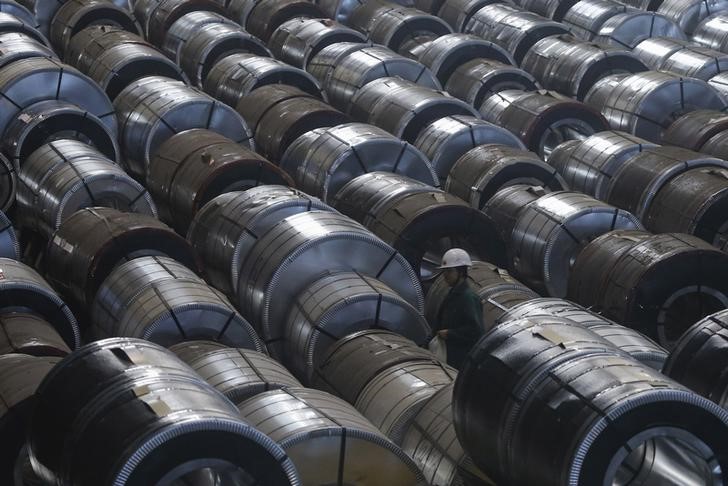(Adds comments from Chinese official on steps taken)
WASHINGTON, April 19 (Reuters) - The United States and seven
other countries called on Tuesday for urgent action to address
global steel overcapacity, a day after China and other major
steel producing countries failed to agree on measures to tackle
an industry crisis.
Representatives of the United States, Canada, the European
Union, Japan, Mexico, South Korea, Switzerland and Turkey agreed
that urgent steel industry restructuring was imperative, and
must be market driven, according to a joint statement released
by the U.S. Department of Commerce.
They also agreed that their governments should not provide
subsidies or other support that sustain loss-making steel plants
or encourage additional capacity.
In a separate statement, U.S. officials said they would
continue to lobby for action on steel with trade partners.
"It is our shared goal that other economies, including
China, will come to recognize the value of these actions and
will join our collective effort to address the causes of the
current excess capacity problem," Secretary of Commerce Penny
Pritzker and U.S. Trade Representative Michael Froman said in a
separate statement.
"The United States will continue to engage bilaterally and
multilaterally with trading partners, including China, to take
meaningful action to meet that goal."
A meeting of ministers and trade officials from over 30
countries, hosted by Belgium and the OECD on Monday, concluded
only that overcapacity had to be dealt with in a swift and
structural way.
Washington pointed the finger at China for the talks
failure, saying Beijing needed to cut overcapacity or face
possible trade action from other countries.
But Chinese officials said it was already taking sufficient
steps to curb capacity, while state news said blaming China for
the global steel industry crisis was a lazy excuse for
protectionism that would be counter-productive.
"It is the slow recovery of the world economy that causes
sluggish demand for steel products, which further leads to the
overcapacity issue in the steel sector," Zhang Ji, assistant
minister at China's Ministry of Commerce, told state-run Xinhua
News Agency on Tuesday.
The Chinese government has taken the most concrete measures
and is paying enormous price to cut overcapacity, said Zhang.
Beijing is also aiming to boost domestic steel demand from
major consumers including the automobile and machinery sectors
and drive the use of high-value added steel structures in
infrastructure, Zhang said.
China, the world's top steel producer and exporter, is also
the fifth-largest importer of steel, buying an equivalent of
13.57 million tonnes of crude steel last year.
China's steel production hit a record high last month as
rising prices, and profits, encouraged mills that had been shut
or suspended to resume production.
The OECD says global steelmaking capacity was 2.37 billion
tonnes in 2015, but declining production meant only 67.5 percent
of that was being used, down from 70.9 percent in 2014.
Britain in particular has felt the squeeze as its largest
producer Tata Steel TISC.NS has announced plans to pull out of
the country, threatening 15,000 jobs. Last week, more than
40,000 German steel workers took to the streets to protest
against dumping from China.
<^^^^^^^^^^^^^^^^^^^^^^^^^^^^^^^^^^^^^^^^^^^^^^^^^^^^^^^^^^^
China steel glut http://tmsnrt.rs/1Y0kLb4
China's steel exports http://link.reuters.com/qyz68v
China's steel production http://link.reuters.com/xyh85w
Asia's top steel exporters http://tmsnrt.rs/1V5I3hY
^^^^^^^^^^^^^^^^^^^^^^^^^^^^^^^^^^^^^^^^^^^^^^^^^^^^^^^^^^^>
